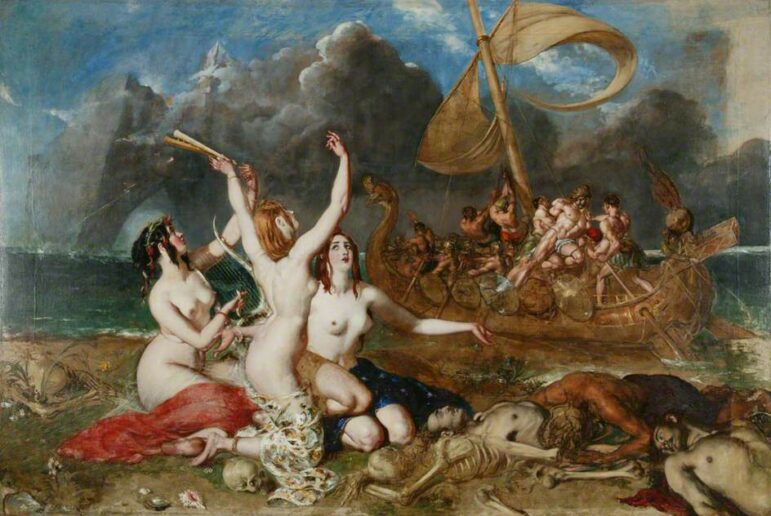In Roman belief, the god Janus holds a unique and essential role, especially during transitional periods, symbolizing the passage of time and the inherent duality of endings and beginnings. January is named in honor of the god, who is often invoked in Roman religion during important events and liminal moments of transition.
For many individuals, the start of a new year is accompanied by a sense of opportunity in the hopes that a change in dates brings fresh approaches to challenges. That opportunity manifests itself in New Year’s resolutions.
While Janus holds sway in transitions a different story may be relevant in understanding the psychology of New Year’s resolutions.
The story of Odysseus and the Sirens is a legendary episode from Homer’s epic, “The Odyssey.”

The Sirens and Ulysses by William Etty, 1837 Credit: public domain
On his journey back home to his island home of Ithaca, Odysseus, the hero of the Trojan War, faced numerous challenges. One of those scary encounters involved the Sirens, beautiful and dangerous creatures with alluring voices that led sailors to lose their attention and crash on rocks. Odysseus sails through the passage the sirens inhabit to continue his journey home.
Forewarned by sorceress Circe about the dangers the sirens pose, Odysseus devises a plan. He orders his crew to plug their ears with beeswax. However, Odysseus wants to experience the beautiful voices himself. Instead of plugging his own ears with beeswax, he orders his men to tie him to the mast of the ship with instructions that, no matter how much he begs or commands, they are not to release him until they are safely beyond the sirens’ melodic reach.
As the ship approaches the Sirens, Odysseus succumbs to their beautiful voices and desperately pleads with his crew to free him. They do not and Odysseus and his crew are spared the fate befallen on others who tried to cross the sirens’ passage.
But the story offers a question that psychologists have grappled with and is related to fulfilling those New Year’s resolutions. In lay speech, we often use the terms self-control and willpower interchangeably. So, in the story, does Odysseus resist the sirens’ temptations through self-control or willpower? And is willpower required for self-control?
Willpower would have resisted the sirens without being tied to the mast, but willpower was also involved in allowing himself to be tied. Lack of willpower is often blamed as the primary reason for failure to meet our New Year’s Resolution.
Earlier this year, an international team of scientists and scholars tackled the question with two experiments. Both of these experiments looked at lay terminology for self-control and willpower.
What they found is that psychologists are not doing the best job of communicating the differences between the two terms. Psychologists generally say that the science is clear: Odysseus’s plan is a form of strategic self-control. This research casts doubt on that thinking. That is, it suggests that internal motivations and intentions are more important and that we have a tendency to have a limited repertoire to resist temptations. They wrote that it may be critical for us to be aware of the “aware of the goodness of some activity.”
What seems to be important is setting goals and creating strategies that support them. For some, it might be avoiding situations that lead to temptation, and for others, it might be increasing their moderation; but overall what is critical is that goals are clear and measurable.
In 2002, Edwin A. Locke and Gary P. Latham published a paper in American Psychologist titled “Building a Practically Useful Theory of Goal Setting and Task Motivation”. The paper summarizes 35 years of research on goal-setting theory. The researchers found that “specific and challenging goals lead to higher performance than vague or easy goals. The study emphasized the importance of setting clear objectives and the positive impact it has on motivation and achievement.”
It is equally important to recognize and honor personal achievements and reward ourselves with affirmations supporting these accomplishments as manifestations of our intentions. It is starting to sound somewhat witchy and that’s the point, with intentions manifestations and planning energy and motivation, but it works. Intentions, actions, and strategic planning can support our goals better than alternatives. In other words, our best strategy to manifesting resolutions, is, paradoxically, giving ourselves permission that our self-control is not the answer.
Odysseus accomplished this by providing specific instructions under specific conditions and a clear goal of when to start the task when to end the task, and how to measure it. Homer did not use the language of psychology but offered some ancient comments that continue to help meet modern needs.
The Wild Hunt is not responsible for links to external content.
To join a conversation on this post:
Visit our The Wild Hunt subreddit! Point your favorite browser to https://www.reddit.com/r/The_Wild_Hunt_News/, then click “JOIN”. Make sure to click the bell, too, to be notified of new articles posted to our subreddit.